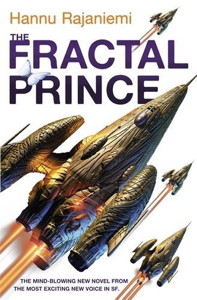The Finnish author tells SFX 's Stephen Jewell about his new novel, themes of identity and how he's inspired by The Arabian Nights

Hannu Rajaniemi shot to success a couple of years ago when his debut science fiction novel, the dazzling The Quantum Thief , was heaped with praise from both English and Finnish readers. The first of three (a trilogy famously signed practically on the spot by Gollancz on the basis of just 24 opening pages), it is followed this year by his "difficult second novel," The Fractal Prince . We caught up with the novelist to find out more about his processes and plans...
SFX: After the rapturous reception that greeted The Quantum Thief , are you pleased with the reaction to The Fractal Prince ?
Hannu Rajaniemi: It’s delightful to see how well both books been received but The Fractal Prince seems to have divided the audience a bit more than The Quantum Thief . It was a bit more structurally ambitious and some people have found it a bit more confusing than the first book – although others have said that they found it easier to follow! But it’s always pleasing when you write about your own obsessions to see that there are so many other people out there who also share them.

Lead character Jean de Flambeur is quite an elusive presence. Are you using him to comment on the shifting nature of identity and the art of storytelling?
There’s an underlying theme of identity that runs through both books. The Quantum Thief was concerned with memory and how our memories shape who we are while The Fractal Prince is very much about stories in terms of how, with our consciousness, we shape the kinds of stories we tell about ourselves and how we spin tales within tales in our heads to keep us alive. Also what would we do with stories in a post-human future: could they survive as a kind of currency or some sort of tool that invades peoples’ heads?
You also have body thieves in The Fractal Prince …
Sign up to the SFX Newsletter
Get sneak previews, exclusive competitions and details of special events each month!
That notion comes from some far-out philosophy-of-the-mind ideas by Douglas Hofstadter , who is best known for his early book, Gödel, Escher, Bach: An Eternal Golden Braid . He has this idea that our consciousness is on some kind of strange loop that isn’t necessarily restricted to the space within our brains as it spreads out when we interact with other people. What happens is that we construct a representation of who we think another person is and they do the same to us. So we end up with this infinite recursion of versions of each other inside each other’s heads as we become intertwined with the people we interact with. If you follow that kind of thinking through to its logical conclusion, this is an effect that, given a suitable framework around it, could be used to invade somebody else’s mind and take it over.
The premise of The Fractal Prince takes its lead from The Arabian Nights …
It seemed like a very natural link when you’re dealing with themes of stories within stories. The Arabian Nights is very rich body of source material and it’s also a very interesting, early construct in itself. There’s some quite science fictional material in there and it’s obviously been a big influence on Western culture. It was a nice way to portray this future world where technology approaches magic.
Were you also interested in its historical context?
You have these stories where people discover strange treasure in the desert or invade tombs. If you look how The Arabian Nights evolved, ancient Baghdad and Cairo were both built upon the ruins of ancient civilizations and grave-robbing was like a proper profession back then. There were manuals published about how to avoid the traps in the pyramids. I thought that was an entertaining analogy for the situation in the city of Sirr in The Fractal Prince , which exists amongst the ruins of technology in a world gone wild in a much more advanced period on Earth, as they try to scrape together some of the artefacts and software they find in this technological desert.
It’s a well-known paradox in quantum mechanics but it hasn’t been used that well previously in science fiction. It’s also a very Arabian Knights -esque idea as it provided an interesting imprisonment mechanism, where we have a box, a jar or a lamp that contains some kind of dangerous creature that you release at your peril. But I was afraid I’d written myself into a corner. You have a bit more freedom in fiction than science but because I’ve trained in physics and mathematics, I can at least be reasonably rigorous in those areas. I don’t consider myself a hard, hard sci-fi writer in the sense that I never take any liberties with reality but you should stay true to the assumptions that you make, even if it’s painful, because it’s that which puts the science in science fiction.
The Fractal Prince is the second part of a trilogy. What can you tell us about the final instalment?
It’s quite heavily concerned with games, which have a very powerful effect on the human mind. In games, we have some freedom to choose who we are as we take on specific roles or impose deliberate constraints on ourselves in order to have fun. This reaches another level in role-playing games and massive multi-player online games, where you create an avatar for yourself. I’ve got some background in tabletop and live action role-playing games, as there’s quite a rich culture of that in Nordic countries like Finland and Sweden as opposed to the Anglo-Saxon world. People create quite artistically ambitious scenarios that go way beyond Dungeons & Dragons . So the themes of the trilogy come together with these kinds of elements. In The Quantum Thief , we had the Zoku, who are like a post-human culture that revolves around games and game designs in various forms, so the third book is going to be a very Zoku heavy book.
Thanks Hannu!
The Fractal Prince is available now from Gollancz in hardback, paperback and digitally. Read a review of The Fractal Prince on the site here and in the meantime, remind yourself why we gave The Quantum Thief four and a half stars back in 2010. Follow Hannu Rajaniemi on Twitter here .
Stephen Jewell
SFX Magazine is the world's number one sci-fi, fantasy, and horror magazine published by Future PLC. Established in 1995, SFX Magazine prides itself on writing for its fans, welcoming geeks, collectors, and aficionados into its readership for over 25 years. Covering films, TV shows, books, comics, games, merch, and more, SFX Magazine is published every month. If you love it, chances are we do too and you'll find it in SFX.


